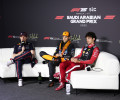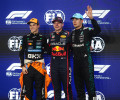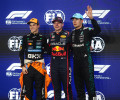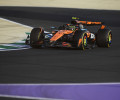F1 - 2016 Belgian Grand Prix - Friday Press Conference
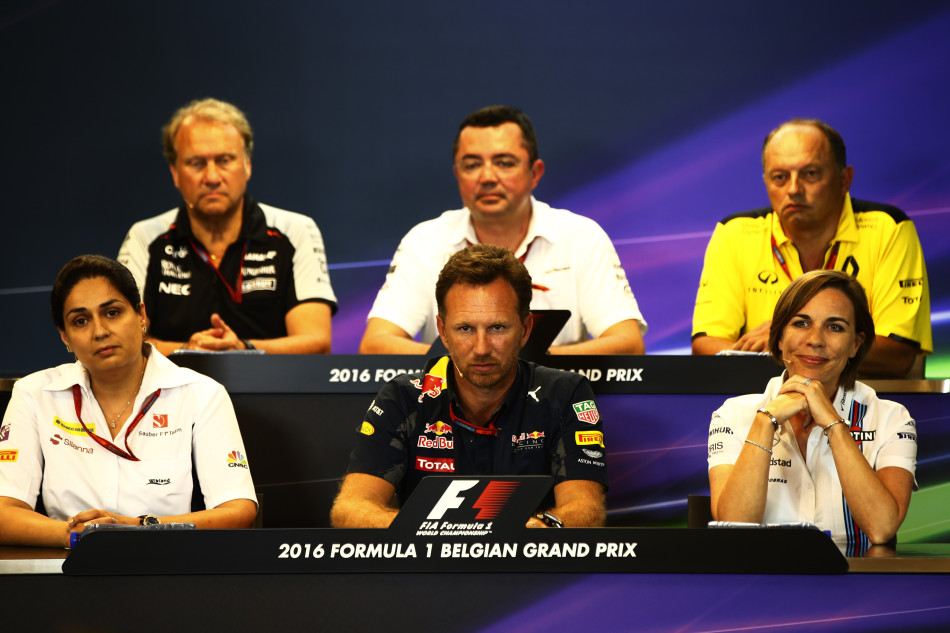
TEAM REPRESENTATIVES – Christian HORNER (Red Bull Racing), Claire WILLIAMS (Williams), Monisha KALTENBORN (Sauber), Eric BOULLIER (McLaren), Frédéric VASSEUR (Renault), Robert FERNLEY (Force India)
PRESS CONFERENCE
Eric, if we could start with you please. Let’s start by talking about the updated power unit you’re running in both cars this weekend. Where is it better than the old one and do you have any further reliability worries after what happened to Alonso this morning?
Eric BOULLIER: As whole it’s very easy to understand. The first is engine power from the ICE and obviously the power recovery you can get from the turbo and the MGU-H. So on that [Honda] did a brilliant job to improve both compounds, let’s say, on both systems. In terms of reliability, no, we don’t have any concerns. It was a small issue, which cost us a full power unit this morning and the session but you could see in practice two both cars ran faultlessly, so I think it’s far?
Can you put a number on the lap time gain you’ve found with this power unit?
EB: Yes I can, but I will not share it with you!
We’ve seen former motorsport director of Volkswagen Jost Capito with McLaren this weekend. When does he start with the team and can you explain to us where he’ll fit into the current management structure?
EB: Yeah, it’s very easy. He’s going to start very soon; it’s a question of days. He is here this weekend as an observer, that’s why he’s not wearing any team uniform. He’s going to be CEO of McLaren Racing, so chief executive officer.
Thank you, Eric. Claire if we could move onto you. I’d like to start by talking about drivers. Your technical boss Pat Symonds was quoted recently as saying that Williams is ready to sign a top driver. Now, one of the interpretations of that is that you don’t currently have a top driver, do you agree with him?
Claire WILLIAMS: I think actually Pat’s comments in that article that came out over shutdown were comments that were made in January, so it’s quite odd that they are now brought out. But Pat, when he was making those comments, was making a reference to one particular driver. It was not in reference to our current two. I think as we have said very clearly we are very happy with the job Felipe and Valtteri have done for us. I know everybody is waiting for our announcement now that lots of other teams have made theirs, but we are not ready to announce our line-up for ‘17 yet but we are working through all our options but I hope we will be able to make that announcement shortly.
When do you think we will get an announcement from you?
CW: By the end of the year.
OK. Moving on to Spa: this is a track where you have traditionally been very strong, although you seemed to have a few issues this afternoon, just 16th and 17th fastest. How confident are you of a good result this weekend?
CW: I think after our performance in the past few races where we expected the circuits to suit our car, it wasn’t the case for a number of reasons. We’ve obviously been working hard to try to analyse where we are going wrong and it is really frustrating fro the team and we do have a really tough battle with Force India at the moment – we don’t want them to take our fourth in the championship. It’s going to be another tough weekend, as much as this circuit does suit our care, but there are also elements of it that don’t. So I don’t know. After today’s performance, where we’re finishing 16th and 17th, we obviously had some issues, I’m not entirely sure where we are going to finish on Sunday but I certainly hope it’s in the points.
OK thank you Claire. Bob, Force India is another team that has a very good record here and things clearly going very well for you so far – third and fifth quickest this afternoon. You’re quick here today, do you have Williams in your sights, do you think you can beat them this weekend and what about the Constructors’ Championship?
Robert FERNLEY: Well, I think we’d like to beat them, but I think you have to look at it that probably Spa and Monza are going to be quite critical races, because as you rightly said earlier, they do tend to favour Williams. So, at the end of Monza we need to look at where the situation is and whether we’ve got ‘game on’ for a hard fight until the end of the season. I think these two races are quite critical because historically and on normal expectations you’d expect Williams to be stronger.
Let’s talk about drivers as well. Vijay Mallya said at the British Grand Prix that both Nico and Checo are under contract for 2017 but Checo has said that he’d make a decision after the summer break. Has he done that?
RF: Well first of all both Checo and Nico are both under contract and that’s the normal way you would work as obviously we need continuity in the drivers, we’d very much like to keep the two together, but with Checo come highly sophisticated and complex commercial negotiations and those obviously have got to play their part as well. But that can only come after we’ve secured the two drivers in the first place. That’s the process we’re under now and I would be very surprised if we’re not staying with the two drivers in 2017.
Fred, coming to you, your driver situation is equally fluid, so when do you expect to make a decision for next year?
Frédéric VASSEUR: Quite similar to Claire, before the end of the year. We are not under pressure to take a decision. We will take a decision in the next few weeks or months.
Are drivers for 2017 a priority for you or is it more important to get the technical structure of the team sorted?
FV: Drivers is the priority for everybody, you can’t race without being concerned by the drivers. [Remainder of answer inaudible]
What is the likelihood of Esteban Ocon coming back to you for next year as a race driver, because he’s done some FP1 sessions for you this year, he’s now gone to Manor. Is he a possible for next season for you?
FV: It is possible. Don’t worry we will take a decision soon.
Q: Monisha, like Renault, Sauber are rebuilding. Now that you’ve had new investment, what is the plan for the rebuilding? Is there a timeline?
Monisha KALTENBORN: Well, you want to do things as quickly as you can because we still have to achieve a few things this year and there are not than many races left. At the same time, we have such a big change coming up for next year where you also really don’t want to lose time, and get on straight away to that year. We are already in that process but now, with the new ownership we have, the trust we’ve been given, we are of course on a very different basis. Simultaneously and very quickly we have to look at the technical structures, people, drivers, the financial status. All of that has to be done actually in parallel, and is already happening.
Q: You said you still have things you want to achieve this year. Is one of those scoring points? You’re the only team on the grid that hasn’t done that this year, so we’ve got upgrades on the car this weekend, are we going to see more as you keep pushing to get that point?
MK: We’ll see a few bits and pieces still coming but nothing really extremely big because we are already on to the new car – but staying where we are is certainly no option. Now, we’ve had a season before where we didn’t score points. It had many reasons but it’s not enough to say that we’ll just manage it somehow again. We have to score at least a point, if not more and make sure that we’re getting back into the usual routine, the way we’re used to working.
Q: Christian, the team moved ahead of Ferrari at Hockenheim, last time out, on the evidence of today, you’ve stayed ahead. What are the prospects for the coming races. Do you see yourselves as staying ahead of Ferrari? Can you challenge Mercedes?
CH: They’re two very different things. One, staying ahead of Ferrari, obviously that’s our target and goal. I think the next two races represent our biggest challenges of the nine races remaining. Very power-dominated circuits, here at Spa and Monza in a week’s time. I think Mercedes, we know there’s a significant gap to. We’ve been closer at some races than others. Hopefully there will be opportunities in some of the race venues coming up – circuits spring to mind like Singapore – that we can give them a harder time. And, of course, they’ve got some issues to deal with this weekend with one of their cars. So that represents other opportunities.
Q: How important is second place in the Constructors’ Championship to you – or is it all about 2017. Is that the only thing that matters?
CH: It’s worth a few million pounds, obviously, like all these positions do, so it has a significant value to us. So there is a big push to carry the momentum that we’ve built over the last few races, right to the last race in Abu Dhabi. And then, of course, behind the scenes, as with all the teams, there’s a big development programme under way on the 2017 car with a big regulation change coming. So it’s a busy time, certainly in the factory at the moment.
QUESTIONS FROM THE FLOOR
Q: (Marc Surer – Sky Germany) A question for Fred Vasseur. Today, I think it was a premier that a car started on the track. Can you explain, first of all how it stopped and secondly how you got it restarted?
FV: During the session we had a sensor failure and we stopped the car, we decided to stop the car. Then we restarted the car with the MGU-K and the battery. It’s not the first time we did it. I think all the other teams did it in the past.
Q: (Oana Popoiou – F1 Zone) Question for Mr Fernley. Force India has a good chance this year to finish fourth. Is there a compromise to be made by focussing on the battle this year and developing the next year’s car?
RF: No. They’re two completely separate programmes. The battle obviously is for us to take to Williams. Williams are in the lead, they’re an extremely competitive and competent team and we’ve just got to battle hard to try to overtake them. As far as the ’17 car is concerned, that’s a factory issue and we’re flat-out in the factory, as I’m sure all the other teams are as well. So they’re two separate programmes entirely.
Q: (Thomas Lund Hansen – Morgenavissen Jyllands Posten) I have two questions for Mr Vasseur. You’ve said that Renault needs a leader. What characterises a leader and does Kevin Magnussen have these qualifications?
FV: We have to build up the project on a driver because I think it’s also a catalyst for the project, for the team. He needs to motivate the team. If you have a look at the success stories of the past, Sebastian with Red Bull or Michael Schumacher with Ferrari, all the good story and long success stories was built up also on the drivers. We have to do the same for the next six or seven years. Kevin is doing the job. I won’t come back on the fact that I have to take a decision on the drivers. I will do it quite soon, be sure, he is doing the job. We know that we have to improve too on the structure and it’s not a question just on the drivers be sure. I’m happy with my guys.
Q: (Dieter Rencken – Racing Lines) The current engine regulations took over five years to agree and they currently have about four and a bit years left to run before they expire at the end of 2020. We have an interesting spread here in that we have four customer teams, an exclusive partner team and a manufacturer. When do you believe that we should start looking at the new regulations for 2021 onwards and also what would you like to see included and enshrined in those regulations?
CH: Well, it’s very simple really: cheap, loud, fast engines. I think what we have now... obviously to abandon that fully would be irresponsible, an awful lot of development and R&D has gone into these engines but I think cost is a significant element, particularly for the teams that are paying for the engines. I think that we’re addressing the chassis side of things already for next year, making the car more aggressive, faster and so on, I think one of the elements that is missing from Formula One at the moment is the sound and I think that’s a key aspect that needs to be addressed in engine regulations moving forward. But probably not moving too far away from the architecture that we currently have. I think to rip it up in its entirety this far into the game would probably be the wrong thing to do.
EB: I think that if you want to address the cost and obviously the convergence of performance we believe that the regulations should be extended after 2020 with the current ones. As Christian said, part of the show is maybe we miss better sound or better quality sound for the engines so that’s something that needs to be addressed technically but clearly if you have stability in the regulations and some longer term projects, obviously the convergence of performance will happen quicker and the cost will go down.
CW: I would echo what Christian and Eric have said. Obviously from an independent team’s perspective whereby we are a customer, having those regulations outlined beyond 2020 and stabilised inevitably will help us if we are to go out and look for our own engine partner past 2020 when our Mercedes relationship will come to an end will be really important. I obviously believe that the hybrid element of the current power unit is part of the architecture that we should maintain. I think it’s a very important message that Formula One can send out but yeah, I would echo everything that Christian and Eric have said.
FV: It’s quite similar to everybody else in that if you want to have more exciting racing then to close the gap between everybody, we need to get the convergence on the engine also and by the way, we would be able to reduce the cost for the future, but if you drastically change the regulations you will increase the costs because you will have to do research and development and at the other end you will increase the potential gap between everybody. But I think we have to stick to the current ones and for sure we have to adapt some points because it makes sense but not to change the regulations drastically.
MK: As an independent team that pays for its engines, for us of course the costs are extremely important and one thing is with stability to bring the cost down but equally important is the changes. Ancillary costs can get very high and this is something which independent teams equally suffer from because in addition to the costs with the engine itself brought in which were much higher than the previous engine, the costs you had around building that engine in the chassis side were extremely high for us so stability is very important. Of course as Christian said, you have to keep in mind that the show has to be a good one and we have seen this time a lot went wrong in introducing the engine. At the same time, you also have to make sure that the interests of the manufacturers are looke at because they have vital interests in introducing certain technologies. So I think looking at all these very different positions, it’s very important to start talks now, because we’ve seen in the past that engines were cancelled overnight, whilst different concepts were introduced, we really need a long time to be able to agree something sensible and not again be in a situation where in six months time you have to decide something.
BF: I think I would endorse what Christian said. We need to have something that’s very competitively priced, addresses the issues in terms of noise but I think we’re fooling ourselves if we think that as independent teams we have any say in these things. At the end of the day the manufacturers will decide what they’re going to do and we will be given a take-it or leave-it situation.
Q: (Silvia Arias – Parabrisas) For M. Bouillier, yesterday Fernando Alonso said he is not enjoying this Formula One. I would love to know what are your feelings about that, what it means to have a driver who is not enjoying driving?
EB: Well, I think we have been working on changing the regulations for next year and as McLaren was concerned we were pushing a little bit harder. It’s true that the regulations today... drivers enjoy qualifying today because we are now breaking records so I think it’s fast enough. Drivers enjoying driving a physical car to drive and clearly Fernando is one of the most experienced drivers on the grid so he remembers the cars in 2005 and 2006 where they were much more lateral Gs than cornering speed and this is what the drivers like. I think next year’s regulations will fix part of or most of the issues actually. They may have today by not enjoying the cars, the tyres get fatter, the cars... now you have to save fuel, save tyres to be competitive during the race and I think by changing the regulations they will enjoy it more. So we have discussed this matter many times, it’s understandable and I think F1 anyway should have this wow aspect. When a young driver comes in and realises that F1 is the pinnacle of motorsport and even including driving the car is the most difficult car to drive.
Q: (Louis Dekker – NOS.NL) Christian, it’s been a long time since Red Bull had a one-two in a race. Imagine there’s a possibility on Sunday in the closing stages, Ricciardo leading the race, Verstappen very quick, wants to win his home race. How do you prevent Mercedes-like problems in the closing stages?
CH: Well, we talk about these things beforehand, you discuss tactics, you try and come up with set rules in certain situations and then the race starts and everything gets forgotten. The guys are racers at the end of the day and if we were in a fortunate enough position to be racing for a victory and you’ve got a driver racing in front of – well, I think half of Holland is coming here this weekend by the looks of things – I can’t imagine that he wouldn’t go for it. I think it would be wrong for us to interfere with a race like that. All we ask of the drivers is give each other enough space to work with. If you’re going to race each other, race fairly and remember you’re carrying the aspirations of the 750-odd people that you represent when you’re driving those cars. It’s not just about the drivers.

 Facebook
Facebook Twitter
Twitter

